An Applied AI Engineer leverages cutting-edge artificial intelligence technologies to create intelligent solutions that enhance processes across various industries. They focus on developing AI models and integrating them into existing systems, ensuring smart decision-making and automation.
Skills that an Applied AI Engineer needs include proficiency in programming languages such as Python, a keen understanding of machine learning algorithms, and expertise in data analysis, along with abilities like critical thinking and collaboration.
Candidates can write these abilities in their resumes, but you can’t verify them without on-the-job Applied AI Engineer skill tests.
In this post, we will explore 7 essential Applied AI Engineer skills, 8 secondary skills and how to assess them so you can make informed hiring decisions.
Table of contents
7 fundamental Applied AI Engineer skills and traits
The best skills for Applied AI Engineers include Machine Learning, Data Analysis, Programming, Statistics, Neural Networks, Data Preprocessing and Model Deployment.
Let’s dive into the details by examining the 7 essential skills of a Applied AI Engineer.
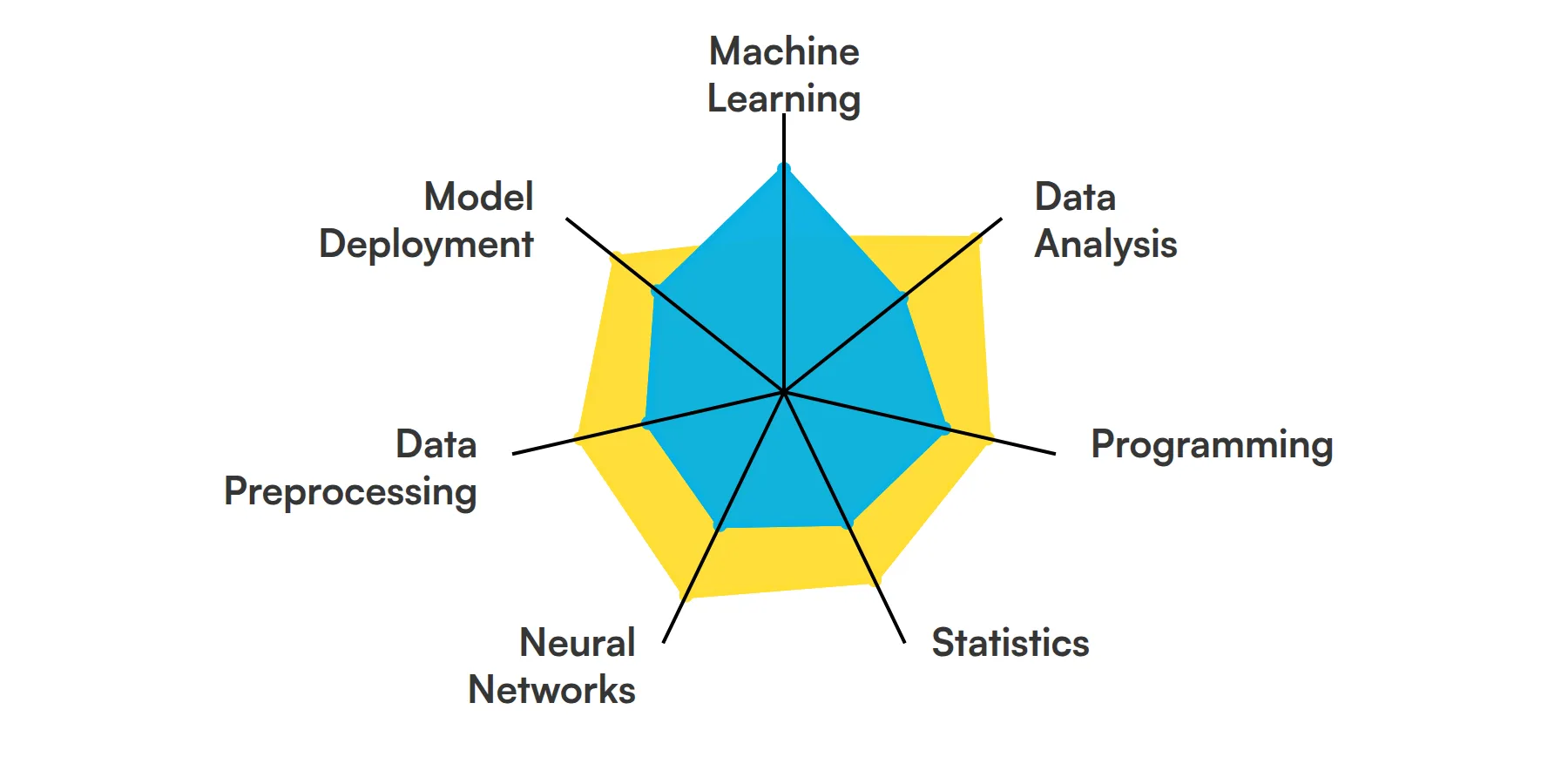
Machine Learning
An applied AI engineer uses machine learning to design and implement algorithms that allow systems to learn from data. This skill is central to creating models that can predict outcomes or classify data, optimizing solutions based on real-world input.
For more insights, check out our guide to writing a Machine Learning Engineer Job Description.
Data Analysis
Analyzing large datasets is a routine task for an applied AI engineer. This skill involves cleaning, processing, and interpreting data to extract meaningful insights, which are crucial for training effective AI models.
Programming
Fluency in programming languages like Python, R, or Java is key for an applied AI engineer. These languages are used to write the code that implements AI models and processes data, providing the backbone for AI applications.
Check out our guide for a comprehensive list of interview questions.
Statistics
A strong grasp of statistical methods allows an applied AI engineer to make sense of data patterns and variability. This knowledge supports the development of accurate models and the evaluation of their performance through measurable metrics.
Neural Networks
Understanding neural networks is crucial for tasks involving deep learning. An applied AI engineer uses this skill to design models that mimic human brain functions, enabling complex data representations and high-level task automation.
Data Preprocessing
Before any model development, data preprocessing is essential for cleaning and organizing raw data. An applied AI engineer spends significant time transforming data into a format suitable for analysis, which often involves normalization, filtering, and augmentation.
Model Deployment
Deploying models to production environments is a critical facet of the role. Applied AI engineers ensure that models function as intended in real-world applications, bridging the gap between development and user-facing solutions.
8 secondary Applied AI Engineer skills and traits
The best skills for Applied AI Engineers include Cloud Computing, Natural Language Processing, Visualization Tools, Version Control, Big Data Frameworks, APIs and Microservices, Reinforcement Learning and Ethics in AI.
Let’s dive into the details by examining the 8 secondary skills of a Applied AI Engineer.
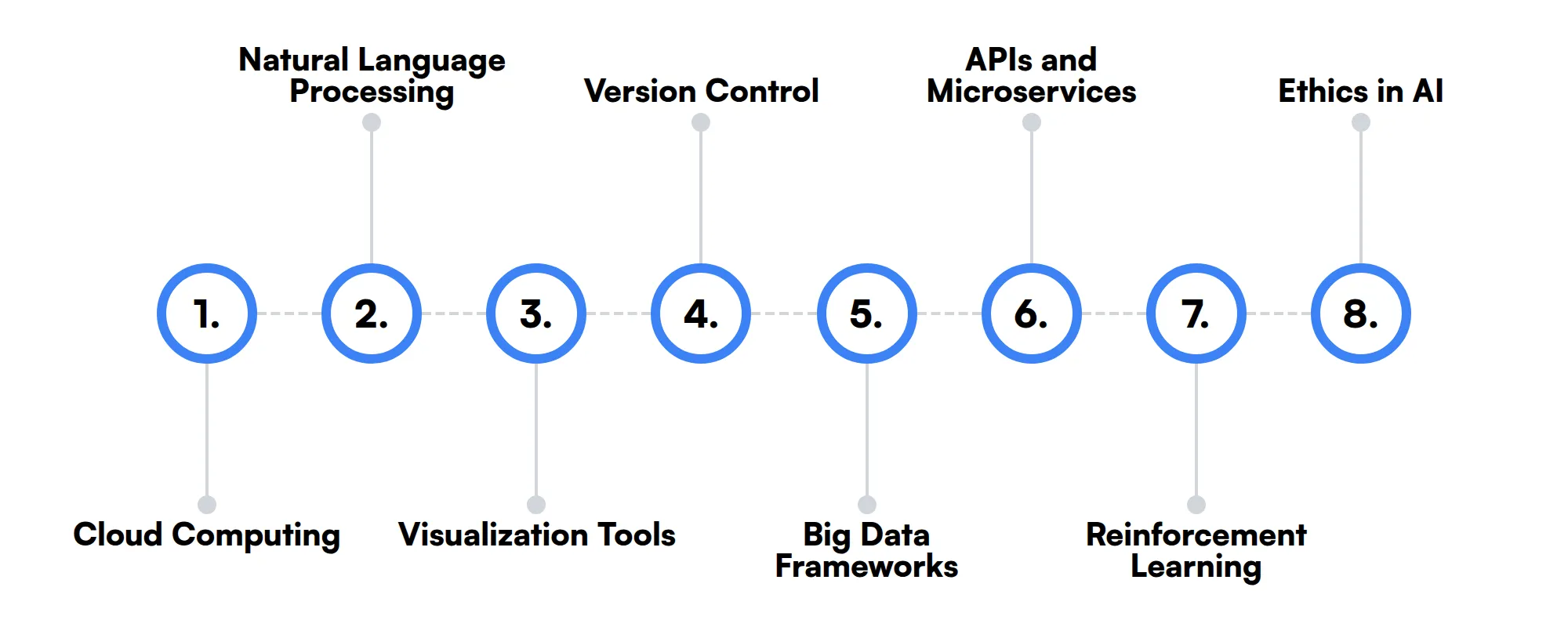
Cloud Computing
Familiarity with cloud platforms like AWS, Google Cloud, or Azure helps applied AI engineers leverage scalable resources for model training and deployment, enhancing productivity and efficiency.
Natural Language Processing
While not always required, NLP skills enable engineers to work on projects involving textual data, enriching their capability to design systems for applications like chatbots or sentiment analysis.
Visualization Tools
Using tools like Tableau or Matplotlib, applied AI engineers communicate findings and model insights effectively, supporting decision-making processes with clear visual presentations.
Version Control
Familiarity with version control systems like Git ensures that applied AI engineers can manage changes in their codebase efficiently, facilitating collaboration and enhancing project organization.
Big Data Frameworks
Knowledge of frameworks like Hadoop or Spark is beneficial for processing vast amounts of data, enabling applied AI engineers to handle big data applications and perform rapid computations.
APIs and Microservices
Understanding how to work with APIs and microservices allows applied AI engineers to integrate their AI systems into larger architectures, providing seamless interactions between different components.
Reinforcement Learning
This subset of machine learning can be valuable in scenarios requiring AI to make a sequence of decisions, empowering applied AI engineers to develop advanced autonomous systems.
Ethics in AI
Awareness of AI ethics guides applied AI engineers in creating systems that are fair, unbiased, and respect user privacy, which is increasingly important in today's data-driven world.
How to assess Applied AI Engineer skills and traits
When it comes to evaluating the skills and traits of Applied AI Engineers, the challenge extends far beyond what's listed on a resume. A resume might highlight degrees and certifications, but it doesn't capture the depth of their expertise or their ability to apply knowledge effectively in real-world scenarios. Skills-based hiring practices, such as talent assessments, provide a clearer picture of a candidate's true capabilities and fit for the role.
The specific skills required in an Applied AI Engineer, such as Machine Learning, Data Analysis, Programming, Statistics, Neural Networks, Data Preprocessing, and Model Deployment, need to be assessed in a practical manner. Each of these skills plays a critical role in developing and deploying AI solutions. To accurately assess these skills, it's important to use comprehensive testing tools.
Leveraging tools like Adaface on-the-job skill tests can help streamline the evaluation process. With such assessments, organizations can experience a 2x improvement in the quality of hires and an 85% reduction in screening time. Conducting these assessments helps ensure that candidates not only have the right qualifications but are also genuinely skilled and ready to tackle the challenges of an AI engineering role.
Let’s look at how to assess Applied AI Engineer skills with these 6 talent assessments.
Machine Learning in AWS Online Test
Our Machine Learning in AWS Online Test assesses a candidate's skills in implementing machine learning solutions using Amazon Web Services. Candidates are evaluated on their ability to navigate AWS tools and services relevant to machine learning, demonstrating both theoretical and practical prowess.
This test focuses on machine learning concepts, AWS environment usage, and programming skills with libraries like Python. Candidates are challenged on their understanding of how to leverage AWS services to implement robust machine learning solutions, also encompassing knowledge of data science, data analysis, and Kubernetes.
Candidates who excel in this test typically have a good grasp of AWS DevOps and can integrate machine learning processes within the AWS ecosystem, showcasing skills that span from data science to advanced Kubernetes management.
Data Analysis Test
Our Data Analysis Test explores a candidate's knowledge in handling and interpreting data. This test scrutinizes candidates' abilities to manage datasets, execute data queries using SQL, and interpret complex analytical outputs.
The test requires candidates to show proficiency in data modeling, business analysis fundamentals, and data queries. With scenario-based questions, it screens for abilities in data interpretation using charts and graphs, correlating with statistical and database knowledge.
Candidates performing well on this test are adept at unearthing insights from data, showcasing their ability to address both predictive analysis and trend detection using popular data tools like Excel.

Basic Computer Skills Test
Our Basic Computer Skills Test measures understanding and proficiency in essential computer operations. This foundational test covers areas from typing skills to effective use of Excel and basic system administration.
The skills evaluated include data entry, system administration, and Excel usage. Candidates are tested on their ability to handle tasks requiring basic computer operation proficiency, including the use of shell scripting and fundamental programming aptitude.
High-scoring participants demonstrate an aptitude for Linux operations and possess the ability to perform basic system administration tasks, necessary for seamless day-to-day IT operations.
Statistics Test
Our Statistics Test evaluates a candidate’s capabilities in statistical reasoning and analytical skill. It covers a wide array of topics to ensure comprehensive assessment of a candidate’s statistical knowledge.
The test examines knowledge in statistical fundamentals including probability, regression, and sampling distributions. Candidates also face questions on exploratory data analysis, ensuring they can interpret and apply statistical concepts in practical scenarios.
Candidates with high scores are proficient in utilizing statistical methods for problem-solving and decision-making, confirming their readiness to tackle data-driven challenges effectively.
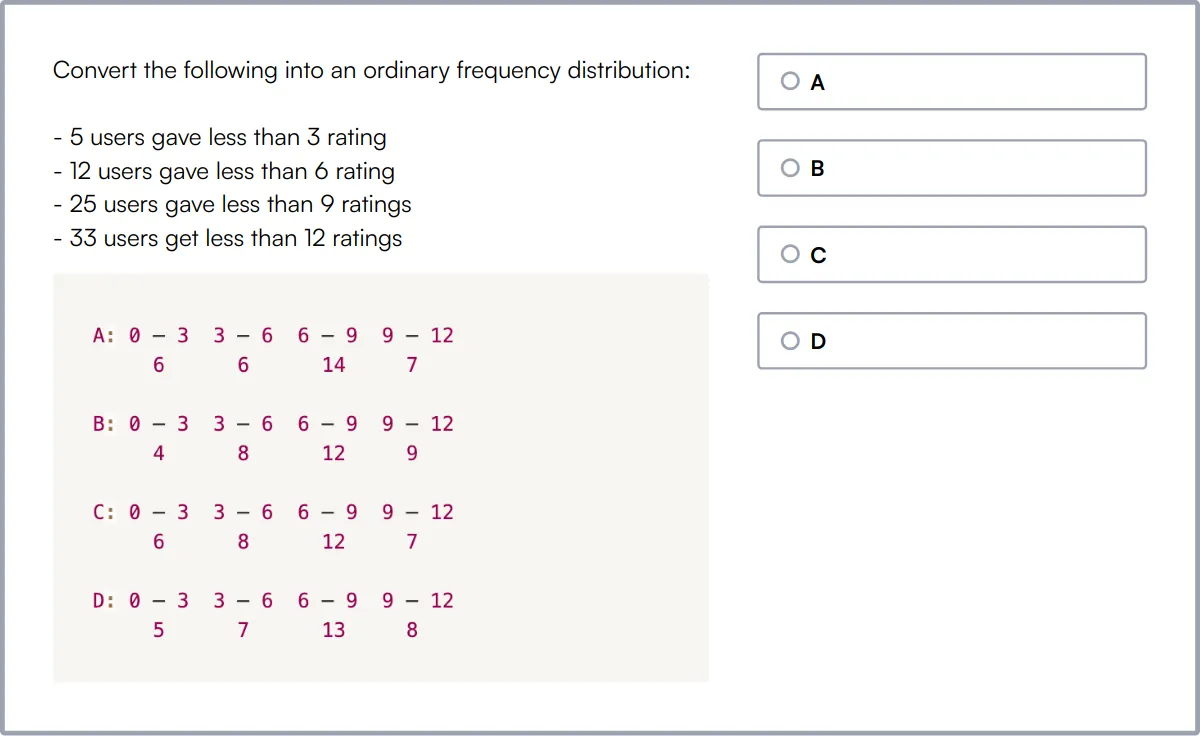
Neural Networks Test
Our Neural Networks Test scrutinizes a candidate's understanding of neural networks and their application in machine learning contexts. It assesses both theoretical knowledge of neural networks and practical Python coding skills.
Candidates tackle questions on deep learning, machine learning concepts, and Python programs, emphasizing neural networks and their frameworks. This includes understanding of NumPy for data science and problem-solving in neural network applications.
Top candidates shine in their ability to design and implement both shallow and deep neural network architectures, demonstrating sophisticated grasp and practical application with relevant tools in machine learning pipelines.
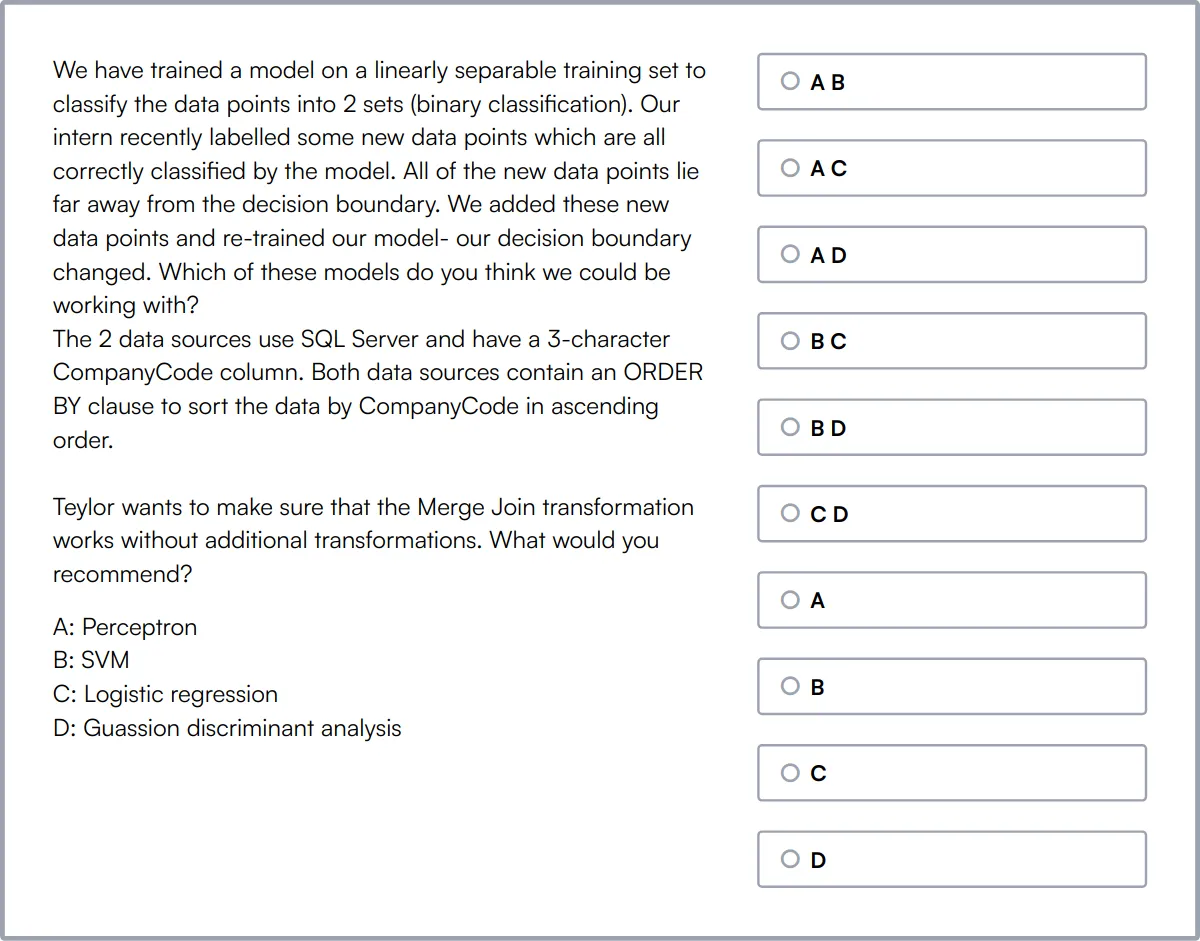
Data Wrangling Test
Our Data Wrangling Test assesses a candidate’s aptitude in organizing, cleaning, and transforming data into a suitable format for analysis. It's essential for evaluating proficiency in data preparation and interpretation.
It involves skills in data extraction, data modeling, and data interpretation. The test demands a thorough understanding of data validation and quality assessment to ensure data is accurately prepared for further analysis stages.
Candidates excelling in this test are adept at managing raw data and translating it into actionable insights, showcasing a high level of skill in data integration and processing routines.
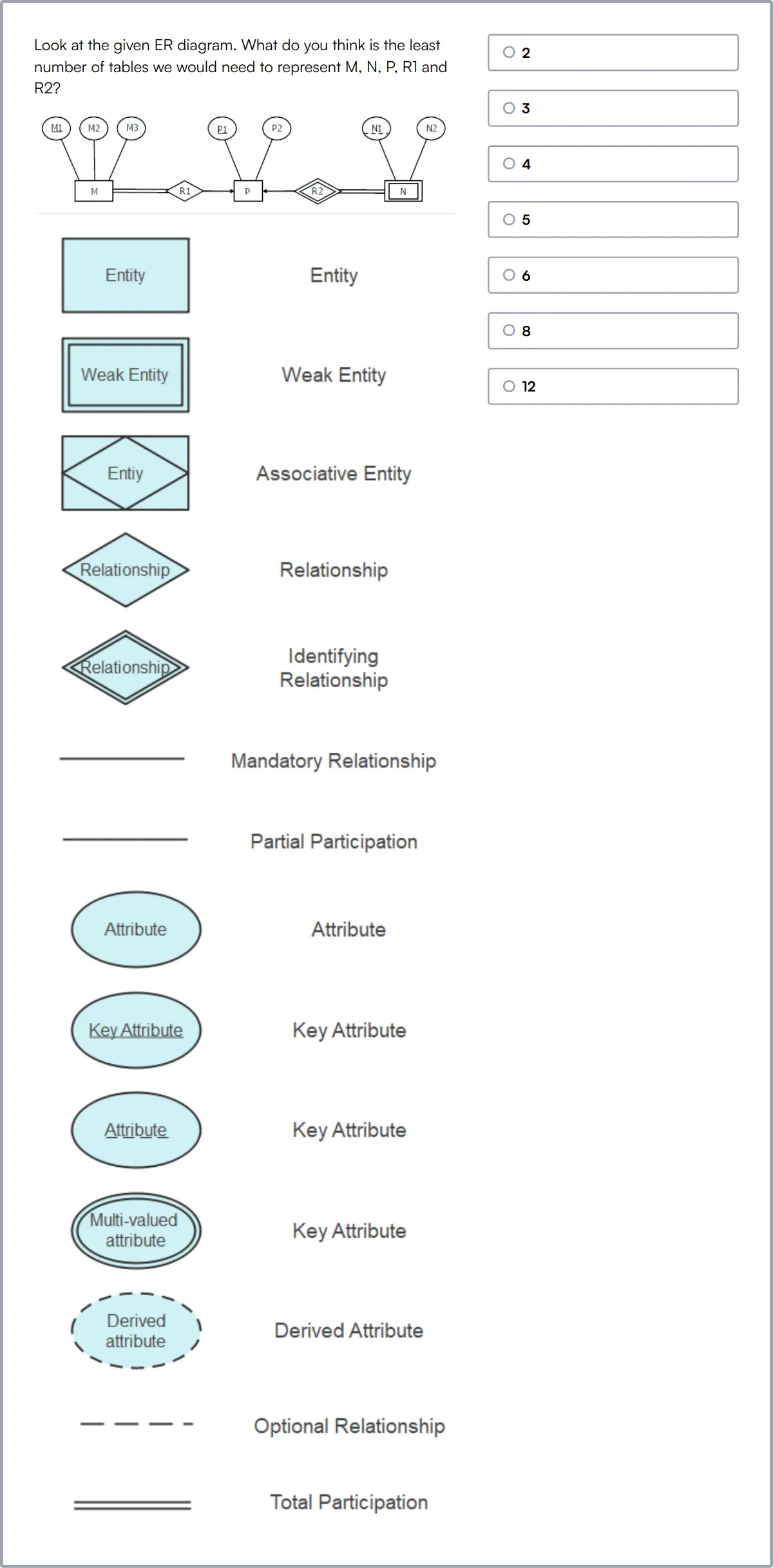
Summary: The 7 key Applied AI Engineer skills and how to test for them
| Applied AI Engineer skill | How to assess them |
|---|---|
| 1. Machine Learning | Examine a candidate's ability to develop and optimize ML models. |
| 2. Data Analysis | Evaluate skills in extracting insights and patterns from datasets. |
| 3. Programming | Assess proficiency in writing clear, correct, and maintainable code. |
| 4. Statistics | Check understanding of concepts to analyze and interpret data. |
| 5. Neural Networks | Review expertise in designing and implementing neural network architectures. |
| 6. Data Preprocessing | Test capabilities in cleaning and transforming raw data effectively. |
| 7. Model Deployment | Determine skills in deploying models reliably onto production environments. |
Applied AI Engineer Test
Applied AI Engineer skills FAQs
What programming languages should an Applied AI Engineer know?
An Applied AI Engineer should be proficient in Python, R, and Java. These languages are popular due to their libraries and frameworks that support AI development.
How can recruiters assess a candidate's machine learning skills?
Assess a candidate's machine learning skills through coding tests, real-world project evaluations, or by discussing their approach to solving ML problems during interviews.
What tools are used by Applied AI Engineers for data analysis and visualization?
Applied AI Engineers often use tools like Pandas, NumPy, Matplotlib, Seaborn, and Tableau for data analysis and visualization.
Why is knowledge of cloud computing important for an Applied AI Engineer?
Cloud computing allows AI Engineers to scale algorithms and manage resources effectively. Familiarity with platforms like AWS, Azure, or Google Cloud is beneficial.
What are the key considerations when deploying AI models to production?
Key considerations include model scalability, monitoring, resource optimization, and ensuring efficient integration with existing systems through APIs.
How can an interview evaluate a candidate’s understanding of neural networks and deep learning?
Interviewers can pose problem-solving scenarios and ask candidates to detail how they would design and train neural networks, addressing challenges like overfitting.
What is the significance of ethics in AI, and how can it be assessed?
Ethics in AI involves fairness, transparency, and accountability. Assess candidates by discussing their approach to bias mitigation and ethical AI practices in projects.
What role do APIs and microservices play in applied AI engineering?
APIs and microservices facilitate integration and interaction between AI models and other software components, enabling modular and scalable system architectures.

40 min skill tests.
No trick questions.
Accurate shortlisting.
We make it easy for you to find the best candidates in your pipeline with a 40 min skills test.
Try for freeRelated posts
Free resources



